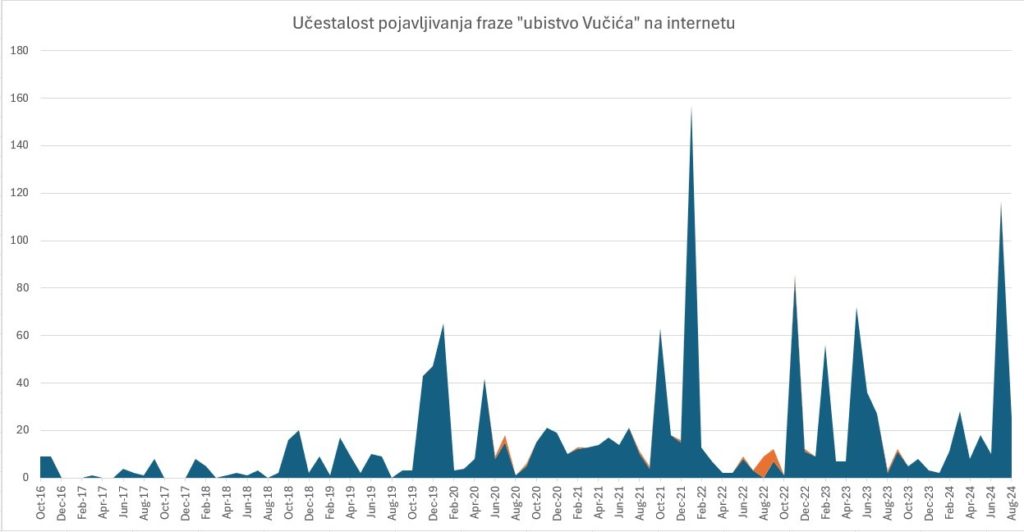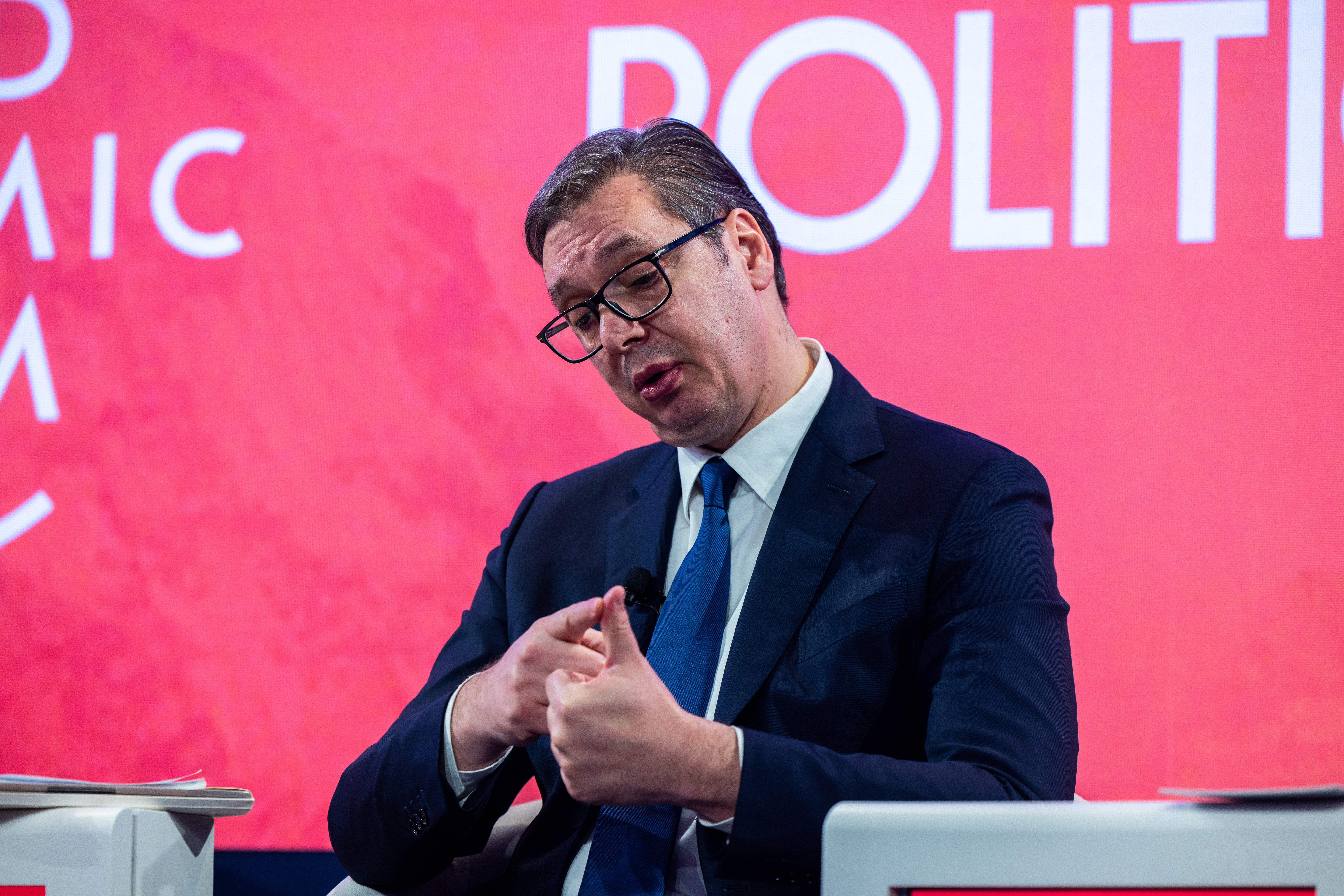Original article (in Serbian) was published on 27/8/2024; Authors: Milica Ljubičić, Stefan Kosanović, Marija Vučić
These days, the media of the United Group are under the scrutiny of government representatives and tabloids who accuse them of calling for the murder of Aleksandar Vucic. This is a tried and tested recipe that the government has been repeating for years in periods of social problems or crises. Through the Ahrefs platform, we analyzed the phrase “murder of Vucic”, which is often heard in the public these days, and the analysis showed that on several occasions in recent years, the use of this phrase in government campaigns coincided with social crises and dissatisfaction. In other words, the public’s attention is diverted from cases of corruption and organized crime, controversial investments or protests, to the story of the “assassination” started and spun by government representatives and tabloids, which is then dealt with by critically oriented media.
The authorities’ campaign against the media of the United Group, which has been labelled as defaming and calling for the murder of Aleksandar Vucic, has been going on for several days. The campaign was launched by Aleksandar Vucic himself. Four days ago, Vucic said that Solak and his political servants “decided to kill him to implement the revolution”. Then the speaker of the National Assembly, Ana Brnabic, shared a video on the X network in which N1 interlocutors allegedly draw a target for Vucic.
The campaign to focus on the alleged assassination of the president comes amid mass environmental protests demanding the suspension of the Jadar project, which the government recently revived.
And it’s not the first time.
In the rest of the text, we remind you of several such campaigns from the past years, when the manipulation of the alleged assassination of Vucic conveniently served the authorities to hide important social problems that caused great dissatisfaction among the public.
The propaganda “bone”
According to Ahrefs’ data, a platform for analyzing the digital market and keywords on the Internet, the phrase “murder of Vucic” appeared most often on pro-regime websites such as Informer, Novosti, Alo, Republika, and Kurir over the years. Nevertheless, the “murder of Vucic” is also widely discussed in the texts of critically oriented media such as Danas, Nova or N1. One of the conclusions that can be drawn from this is that the government and the tabloids, by placing this phrase in the public space manage to achieve their goal – divert the public’s focus from ongoing, important problems that are unfavourable or incriminating the government, so the story of alleged assassinations replaces a story about corruption, crime, election theft, controversial investments, etc.
This platform provides several more interesting insights – the phrase “murder of Vucic” began to circulate more widely on domestic web portals in November 2019 with the controversial cover of NIN amid the “Krusik” affair. It reached its peak in January 2022, in the weeks marked by protests against Rio Tinto, which ended when the government seemingly ended cooperation with this British-Australian company. However, it turned out that it was only postponed, as the public suspected – when Rio Tinto returned during the summer of 2024, and when the protests started again, the government again “spun” this propaganda.
2022: Rio Tinto and Seselj’s announcement of the assassination of Vucic
It is not the first time that the story about Rio Tinto is “extinguished” with this story.
The arrival of this company was probably the “hottest” social topic in the fall of 2021 and the beginning of 2022. The government’s plan to allow Rio Tinto to mine lithium in the Jadar valley caused great public dissatisfaction and massive environmental protests, which were not stopped even by the New Year and Christmas holidays.
These were the weeks when the use of the phrase “murder of Vucic”, according to Ahrefs platform, peaked on the domestic Internet, both in tabloids and in media criticizing the government.
The phrase was “thrown” into the public by the radical leader Vojislav Seselj in a guest appearance on TV Pink in January 2022, when he accused the then president of Montenegro Milo Djukanovic and the leader of the Kavac clan, Radoje Zvicer, of the alleged assassination.
The following day, the then Minister of Internal Affairs, Aleksandar Vulin, repeated these claims, claiming that the Serbian police received information from Europol that there was a criminal group whose goal was to assassinate Vucic.
Then came the statements of numerous state officials and SNS supporters of Aleksandar Vucic, whom someone wants to kill because he is successful and enables the progress of Serbia.
Back then, Slobodan Georgijev, in an article for Vreme, suggested that it was manipulation:
“The only explanation can be that it is one of the mechanisms of public space management: promoting topics that evoke the strongest emotions among citizens, this time emotions of fear and concern. Well, I guess that should mean: let go of that lithium, they killed our president!”.
On the same day that Seselj announced what was in store for Vucic, Ana Brnabic also announced at a press conference that the cooperation with Rio Tinto had been put to an end and moved on to the story of the assassination. It seems that the authorities wanted the story about lithium to be forgotten as soon as possible – however, many remained in doubt that the cooperation was really over – on the margins of the story about the Swiss conspiracy, there were sporadic warnings that Rio Tinto was buying new parcels and that there is a fear that it will return.
Doubts came true just this summer – it turned out that Rio Tinto is back, accompanied by several months of protests and public debates, as well as the propaganda phrase “murder of Vucic”.

2019: The Krusik affair and NIN cover
The “murder of Vucic” also served the authorities in the fall of 2019, at the time of the “Krusik” affair, which incited protests in Serbia and followed the arrest of whistleblower Aleksandar Obradovic.
Obradovic, a worker of this weapons factory in Valjevo, was arrested in October at his workplace on the charge of having disclosed a business secret to the media. Namely, he provided journalists with evidence of abuses in the export of weapons, in which the father of the then Minister of Police, Nebojsa Stefanovic, also participated. Obradovic’s arrest, the lack of prosecution of those responsible, as well as the silence on this topic on national frequencies, caused several weeks of protests in Belgrade.
The authorities then used the announcement on the cover of NIN, which showed an exhibition sniper from the Arms Fair aimed at Vucic. Instead of dealing with the content of the issue that dealt with the affair, the government and the pro-regime media immediately focused on the story of the “murder of Vucic”. Under pressure, Ringier, publisher of NIN, decides to censor this weekly. Instead of the photo, a white cover was published, and that case redirected the discussion from Krusik to issues of freedom of expression.
However, this was not the only front page that was more interesting to the tabloids than the affair itself. Two days after NIN, the newspaper Danas published a caricature of the controversial photo on its front page, where Vucic shows himself as the target. The tabloids labelled this as a “new call for the assassination of the President of Serbia”, and the fabricated affair continued in the following days, completely stifling the discussion about Krusik and the accusations against the Minister of Police, his father and representatives of the authorities.
2019/2023: Gallows to break up demonstrations?
Since the arrival of the SNS at the head of the state, practically not a year has passed without mass protests against the government. This party, on the other hand, tries in every way to suffocate them or divert attention from them.
At the “One in five million” protests in 2019, the question arose whether the government was inserting provocateurs among the demonstrators when two of them carried a mock-up of the gallows. The “gallows” then became the topic of the tabloid media, which presented them as the real reason for the protest – the alleged desire to kill Vucic.
A similar scenario was repeated after the mass murder in the “Vladislav Ribnikar” Elementary School in Belgrade in 2023, which also caused mass protests with numerous demands that did not correspond to the authorities. Demonstrations lasted for months, and at one of the protests, a hanging doll of Vučić appeared. The doll immediately came into the focus of the authorities and tabloids, who then claimed for days that the protests were calling for the “assassination of the president”. This phrase is going viral again.
2021: Accusations that KRIK is involved with a criminal organization planning to assassinate Vucic
February 2021 was marked by the arrest of Veljko Belivuk and the breaking up of his criminal group, which KRIK wrote about years ago. While the tabloids praised the government for allegedly dealing with crime and published morbid details about the torture of members of this clan, KRIK continued to report critically. In mid-February, the text was published under the following title: “Missing young men and devastated families – a tribute to the belated war against the mafia”. The authorities did not like it.
At the beginning of March, the pro-regime media took advantage of the guest appearance of the father of one of the missing young men, who said in a YouTube show that he had been called earlier by someone who introduced himself as “Veljko” and allegedly referred him to KRIK. This was “proof” for the regime and the pro-regime part of the public to accuse KRIK of collaborating with criminals.
Gordana Uzelac’s report was immediately broadcast on Pink, in which “those ready to use the opportunity”, such as the then editor of Objektiv Dejan Vukelic, accused KRIK of being the extended hand of the mafia and of working on the media preparation of the murder of Aleksandar Vucic.
And the editor of Serbian telegraph, Milan Ladjevic, said that “a KRIK journalist, if he kills someone close to the regime, would probably be a hero”.
MPs also joined the attack, and the campaign at least partially diverted the public’s attention from what investigative journalists had been pointing out for a long time – that Veljko Belivuk’s group had the support of the government structures.



